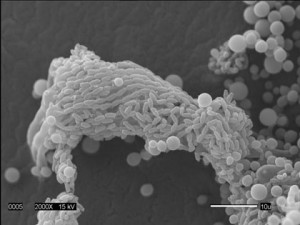Uncovering the Mechanisms Behind Infectious Diseases
Researchers in the Duke Division of Infectious Diseases are active in basic, clinical and translational research related to infectious diseases.
We are leaders in uncovering the mechanisms behind specific infectious diseases and using this understanding to develop effective vaccines and treatments to combat the spread of infectious diseases.

infectious spores produced by the deadly
fungi Cryptococcus neoformans.
Current research initiatives in our division include:
- Development of clinical diagnostic criteria for endocarditis, known as the "Duke Criteria"
- Research on staphylococcal infections at basic, clinical, and translational levels
- Creating management guidelines of fungal and cryptococcal infections
- Pathogenesis, diagnosis and drug therapies of fungal infections including Candida, Aspergillus, Cryptococcus and Dimorphic Fungi
- Pathogenesis of gram-negative infections
- Clinical microbiology
- Tick-borne infections
- HIV pathogenesis and HIV clinical and translational research
- Nosocomial infections and healthcare epidemiology
- Prevention of healthcare-associated infections (HAIs)
- Malarial epidemiology, pathogenesis, and diagnosis
- Biofilms and bacterial-fungal infections
- Viral Pathogenesis (COVID)
- New strategies for diagnosing bacterial, fungal or viral infections utilizing host gene expression
- Antimicrobial Stewardship from patient to health care system
Learn more about our research pathways: